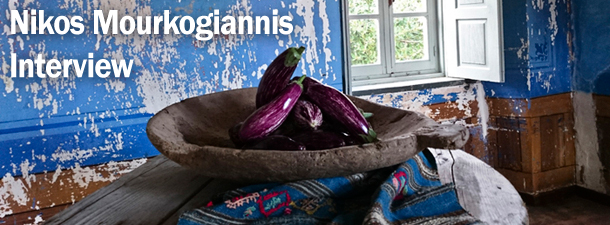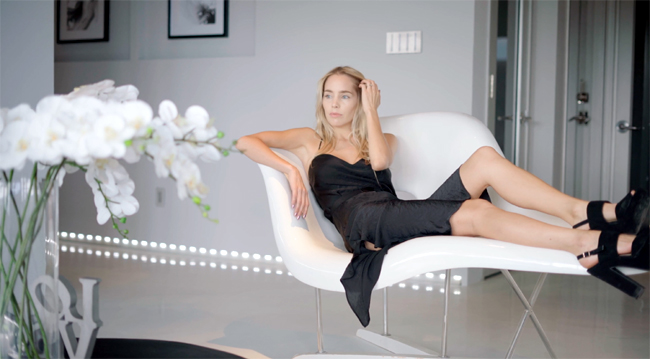Interview with photographer Nikos Mourkogiannis

Nikos Mourkogiannis is a photographer who graduated from the European Institute of Design (IED) and works as a creative advertiser as well as a filmmaker and commercial producer. Nikos was born in Athens, Greece, and had an interest in artistic photography from the time he was very young. His work—which includes a range of topics such as nature and abstract forms—increasingly focuses on visual experimentation and has garnered attention from international institutions. To date, Nikos has exhibited his work globally and is currently preparing for a large showcase in Rome, Italy.
 Nikos likes to make each shot feel both unique and personal. One of his favorite pieces to date depicts the shadow of a fig tree stretching across a white wall in an abandoned cottage. Nikos took the photo in his native Greece and was so moved by it that he subsequently donated it to the Center for Hellenic Studies at Harvard University. Many of his pieces currently reside in well-known locations and his advertising work has only increased his capabilities in digital photography and video.
Nikos likes to make each shot feel both unique and personal. One of his favorite pieces to date depicts the shadow of a fig tree stretching across a white wall in an abandoned cottage. Nikos took the photo in his native Greece and was so moved by it that he subsequently donated it to the Center for Hellenic Studies at Harvard University. Many of his pieces currently reside in well-known locations and his advertising work has only increased his capabilities in digital photography and video.
 Nikos’ is currently gearing up for his exhibition “Arkadia: The Untold Tale” that will take place in Rome at Palazzo Ferrajoli, a wonderful building that was designed in 1627 for an aristocratic family at the heart of the city. Nikos anticipates the show to open before Christmas but the exact date is yet to be determined. “Arkadia: The Untold Tale” has already had two successful American exhibits at the Greek embassy in Washington and at the Greek consulate in New York. He is also preparing another show in Athens, Greece, that is slated for Spring of 2017. Recently, Nikos spoke about this project and his experiences working in the arts:
Nikos’ is currently gearing up for his exhibition “Arkadia: The Untold Tale” that will take place in Rome at Palazzo Ferrajoli, a wonderful building that was designed in 1627 for an aristocratic family at the heart of the city. Nikos anticipates the show to open before Christmas but the exact date is yet to be determined. “Arkadia: The Untold Tale” has already had two successful American exhibits at the Greek embassy in Washington and at the Greek consulate in New York. He is also preparing another show in Athens, Greece, that is slated for Spring of 2017. Recently, Nikos spoke about this project and his experiences working in the arts:
Meagan Meehan (MM) of Entertainment Vine: What inspired the photos from the Arkadia exhibit?
Nikos Mourkogiannis (NM): The show on Arkadia is inspired by the simplicity and the elegance in nature; both are concepts deeply rooted in the Arkadian philosophy. This very region of the Peloponnese has a certain magical light capable of reaching the most remote parts of the human soul. Goddess Diana, god Pan and the heroes of Shakespear’s “Midsummer Night’s Dream” have probably lived here. It’s the place where a visitor may find the true answers to his quest. I, myself, was stunned by the transcendentalaura of Arkadia the very first time I set foot on it.
 MM: How did you arrange this show?
MM: How did you arrange this show?
NM: I’ve tried keeping faithful to the Arkadian Purity in my photographs, either they’re about an old hut, a posh villa, the fisherman’s nets or the portrait of an old woman. It’s simplicity; which means that I used to discover all sorts of untold tales that Arkadia whispered in my ear. The real difficulty I had to face was subtracting rather than adding to landscapes and people who were just beautiful the way they were. All I had to do was reproduce faithfully the sight of the beholding eye.
 MM: What is your favorite photo from this show? Why?
MM: What is your favorite photo from this show? Why?
NM: It’s very hard to tell, it would be as if a father should have to choose his favorite child. However, if I had to choose, I would say it’s a photo of the shadow of a fig tree on the white wall of a deserted Arcadian cottage. The image touches me deeply; to me it personifies Greece, still resisting the passage of time. I gave this photo as a gift to the Center for Hellenic Studies at Harvard University.
MM: What do you have coming up in the future?
NM: I’ve been thinking about a photo exhibit on the concept of kitsch; a set of pictures expressing not only tacky and lowbrow taste but also the compelling need to be noticed by every means. Kitsch may, sometimes, express an aesthetic confusion but, evermore, an arrogant way to impose a style just for the sake of making heads turn and having eyebrows raised. It’s a sign of our days to try rewriting the rules of taste through irony and exaggeration.
 MM: You have stated that a dream project of yours is to make a movie based on Greek mythology. What would the plot be like?
MM: You have stated that a dream project of yours is to make a movie based on Greek mythology. What would the plot be like?
NM: According to Greek Mythology, Zeus was struck by Europa’s breathtaking beauty and he fell deeply in love with her. Europa got pregnant and gave birth to two beautiful demi-god babies. However, Zeus was soon bored and left his new family moving back to the comforts of Mount Olympus. I’ve been thinking about a short movie which could tell today’s ambiguous state of Europe with a symbolic story of a kind. It’s going to take a long time to prepare and to find the funds to shoot it. Nevertheless, I think it’s worth the endeavor.
MM: What is your idea of the perfect composition?
 NM: To find and photograph a touch of imperfection in a perfect context that jumps out as a rebel to the rules of photography. However, one must keep in mind that one has to know well the rules of photography in order to be able to break them adequately.
NM: To find and photograph a touch of imperfection in a perfect context that jumps out as a rebel to the rules of photography. However, one must keep in mind that one has to know well the rules of photography in order to be able to break them adequately.
* * * * *
To learn more about Nikos Mourkogiannis, see here.




Adoro le foto che Nikos Mourkogiannis ha fatto di questa parte della Grecia. Ho desiderato visitare l’Arkadia, per poter vedere questi luoghi bellissimi, di cui l’occhio (e il cuore) del fotografo hanno colto in pieno l’essenza, trasmettendocene la poesia e la profonda bellezza.
These are truly lovely pics. I’ve been to Arkadia and I think the photos do tell the hidden beauty of this magnificent region.of the Peloponnese.